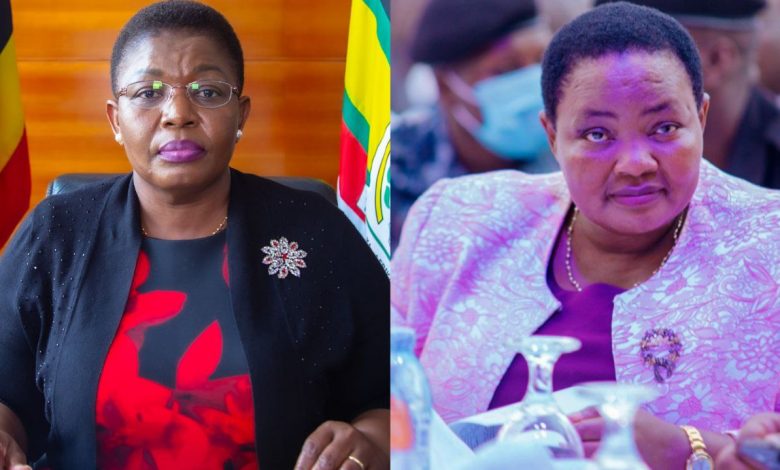NABBANJA, LUMUMBA PUBLIC SPAT: Understanding the Pecking Order in NRM
The public spat and rebuke by Prime Minister Robinah Nabbanja against Justine Kasule Lumumba as to who pays her bills to New York for UN General Assembly, which Nabbanja seems to suggest was an ego trip as she declined to assign her

By Ofwono Opondo
It took fifteen repeat voting and 216 votes for Kevin McCarthy to become Speaker of the United States House of Representatives in March 2023. And also took 216 votes in a stunning single ballot last week as the first Speaker in their history to be ousted, more-over instigated by elements from his Republican Party.
In the UK, the fall of three Prime Ministers in a row, Theresa May, Boris Johnson a.k.a. the Convict, and Liz Truss derisively nicknamed ‘Lettuce’ over the last seven years should all be lessons on leadership humility.
So, the public spat and rebuke by Prime Minister Robinah Nabbanja against Justine Kasule Lumumba as to who pays her bills to New York for UN General Assembly, which Nabbanja seems to suggest was an ego trip as she declined to assign her. Though the rebuke isn’t surprising, it calls for calm reflections on how NRM has built leadership over the years.
And after Hilary Oboloker Onek was schooled to silence by Nabbanja, ministers should know the pecking order in NRM otherwise they get done for because in politics, criticism is never inhibited by ignorance. Nabbanja didn’t have to publicly shred Lumumba to prove being the top wheeler, but probably unconsciously fell into a media trap because few politicians with power rarely consult on.
Since Prof. Yusuf Kironde Lule, Moses KIgongo, Dr Samson Bbaabi Mululu Kiseka, Eriya Kategaya, Francis Wambogo Wapakhabulo, Francis Ayume, Crispus Kiyonga, Kahinda Otafire, Speciosa Naigaga Wandira (Kazibwe), Prof.Gilbert Balibaseka Bukenya and recently Amama Mbabazi, a lot has gone under the bridge for people not to take their positions literally.
In 1993, then high-flyer minister of Trade and Commerce, who nicknamed himself Sir Rich, wrote to Prime Minister George Cosmas Adyebo (RIP) seeking clearance and money to travel abroad which Adyebo turned down. In anger, Sir Rich wrote on the back side of Adyebo’s letter telling off Adyebo that he (Adyebo) doesn’t ‘understand” the ‘importance’ of the external trip. In his typical arrogance Sir Rich asked the Managing Director Coffee Marketing Board (CMB) Ernest Kakwano for funds which Kakwano turned down, and Sir Rich promptly fired him with for ‘insubordination’.
When Sir Rich was asked by the president to go parliament and apologise for his arbitrary action he declined. Museveni then directed then Deputy Prime Minister Kategaya to brief parliament in Sir Rich’s presence, and probably humiliation, that Sir Rich didn’t have the powers to sack an MD of a government corporation. Much later Sir Rich fell with a thud on accusations that he solicited and received a 10,000USD bribe. In another incident, Robert Rutaagi, Managing Director of Foods & Beverages, a government chain-store, sought 35,000USD on a management course in the US which Adyebo halted as wasteful. Rutaagi ate a humble pie and is living a quiet resourceful life in Kampala to-date.
The 2021 fight to thwart Rebecca Kadaga’s third run for parliament speaker contrary to her earlier agreement not to, and the removal Mbabazi as NRM Secretary General and Prime Minister, powerful positions no doubt, provide useful lessons. Nevertheless, courtesy, cadreship and comradeship require that seniors are accorded respect even when they no longer call the shots.
When formal ranks were introduced in the NRA 1988, Museveni catapulted Lt. Col. Greg Mugisha Muntu to Colonel where he sojourned for only two months, skipped Brigadier, promoted to Major General and Army Commander in 1989. And so the criticisms about ‘rapid’ promotions in the UPDF today should be taken with a pinch of salt because there’ve been some beneficiaries before.
Muntu replaced Gen. Caleb Akandwanaho a.k.a. Salim Saleh Rufu and his deputy Fred Rwigyema, arguably the most well-known battlefield commanders dropped in one swoop. In 1997, Gen. David Tinyefuza (Sejusa) bad-mouthed UPDF before a parliamentary inquiry over alleged reasons for the then unending war in northern Uganda. His wings got clipped by Muntu and Mbabazi he probably saw as his juniors, and the rest is history.
The promotions and appointments in UPDF set the pace for a smooth and stable chain of command within the army. The same trend has been for cabinet where people sometimes seen by the bystanders as unqualified or undeserving have been kicked upstairs, and indeed performed well beyond public expectation. Those offered higher responsibilities should focus more result oriented performance and best governance practices than being distracted to broadside shows motivated by cheap media publicity.
Under President Museveni, it is neither necessary nor useful to nurse hangovers over high or lucrative offices one previously held. Just lie low because NRM is like a revolving door, another opportunity could beckon you. If you have previously been a VP, Speaker, SG, or minister, but subsequently on your own accepted a lower scale like RDC, it’s prudent to keep calm than make unhelpful noises, otherwise you could be seen more as a political pollutant. After thirty-seven years in power, NRM leaders shouldn’t fight over wigs, foreign trips, vehicle serial numbers, and per diem, but rather strengthen public service delivery driven by an ideology of inclusive prosperity.
The writer is the Executive Director of Uganda Media Centre





